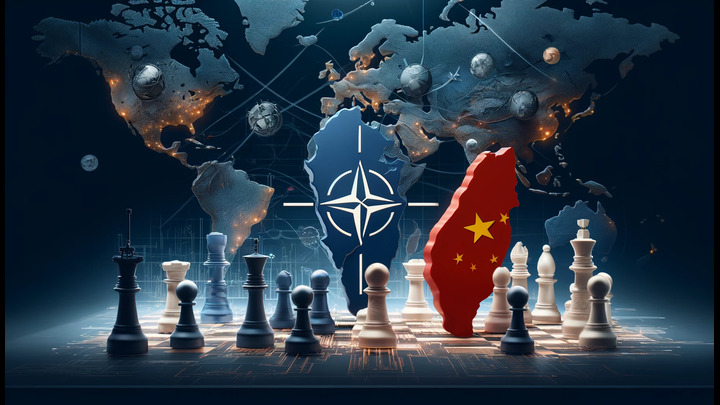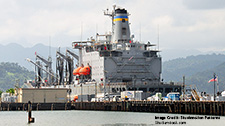Uncharted Territory: Exploring the Legal Ramifications of NATO’s Hypothetical Involvement in Taiwan

Brian Iselin
You might just have been living under a rock to not have noticed that recently there has been a change in tone at the North Atlantic Treaty Organisation (NATO) on the question of its role in Asia more broadly, and Taiwan and China more specifically. Established primarily as a political and military alliance among North American and European countries as a counterweight to Russian delusions of grandeur, NATO is committed to mutual defence and collective security. Its potential involvement in Taiwan presents a complex legal scenario, particularly as the geopolitical landscape involving Taiwan is marked by its contested international status and the sovereignty claims of the People’s Republic of China (PRC).
Moriyasu (2023) discusses the strategic reasons behind NATO’s shift towards Asia, providing insights into the geopolitical motivations that underlie this new focus. Now a 74-year-old 32-country alliance, NATO is divided as never before about where its geographical boundaries should end and who its partners should be; Asia is now featuring in NATO’s rhetoric. As highlighted by Foy and Sevastopulo (2022), recent developments have seen NATO holding its first dedicated discussions on the perceived threats China poses to Taiwan, signalling a significant pivot in the alliance’s strategic focus and underscoring the seriousness with which this shift is being approached. But that talk could become enormously complicated to walk.
When peace has been broken anywhere, the peace of all countries everywhere is in danger.” – Franklin D. Roosevelt, Fireside Chat, September 3, 1939.
This first in a series on the question of NATO “sphere of interest” involvement in Asia, this article delves into the legal challenges and implications of NATO’s potential involvement in Taiwan, exploring the constraints and provisions of international treaties and the broader legal norms governing international relations.
Background: NATO and International Law
NATO’s Legal Framework
NATO operates under the North Atlantic Treaty, which was signed in 1949. Article 5 of the treaty, often highlighted as its cornerstone, stipulates that an armed attack against one or more members in Europe or North America shall be considered an attack against all. This collective defence mechanism is a fundamental principle meant to deter potential aggressors and to ensure mutual security among member states. Importantly, the geographical scope of this article traditionally confines NATO’s operations to North American and European territories, not extending to Asian contexts, including Taiwan. This geographical limitation is crucial in analysing the legal basis for any NATO involvement outside these areas.
Taiwan’s International Status
The international legal status of Taiwan is intricate and highly contested. Following the Chinese Civil War, the government of the Republic of China (ROC) retreated to Taiwan. The PRC, established in 1949 under the leadership of the Communist Party of China, claims Taiwan as part of its territory—a claim not recognised by Taiwan and many other nations. However, the international community, including the United Nations, officially recognised the PRC as the legitimate government of China, further complicating Taiwan’s ability to participate in international organisations and treaties as an independent state. This lack of widespread formal recognition impacts Taiwan’s capacity to engage in international law mechanisms on its own behalf.
Theoretical Involvement of NATO in Taiwan
Scenarios of Involvement
NATO’s involvement in Taiwan could manifest in several theoretical scenarios, each with its own legal and geopolitical implications:
- Direct Military Support: The most direct form of NATO’s involvement would involve military assistance to Taiwan. This could include the deployment of naval forces, provision of advanced weaponry, or logistical support. Such actions would be significant given that they would directly challenge China’s sovereignty claims and could be perceived as an act of aggression by China and other allied nations.
- Humanitarian Assistance: Another less direct form of involvement could be humanitarian assistance. NATO could deploy peacekeeping forces or provide humanitarian aid in response to natural disasters or in situations that may arise from internal conflicts. This approach would likely be more palatable under international law, especially if conducted under the auspices of international humanitarian efforts.
- Diplomatic and Economic Sanctions: NATO could also opt to implement diplomatic pressures or economic sanctions against adversaries threatening Taiwan. While not a direct military involvement, this form of action engages NATO in the regional security issues affecting Taiwan, positioning the alliance as a significant player in Indo-Pacific geopolitics.
NATO’s potential involvement in Taiwan could extend beyond direct military support, humanitarian assistance, and economic sanctions into several other areas, each carrying unique strategic implications:
- Intelligence Sharing and Surveillance: NATO could enhance its support for Taiwan by providing intelligence and surveillance data regarding regional threats. This support could include satellite imagery, signals intelligence, and maritime surveillance, which would help Taiwan better understand and prepare for potential security threats from China.
- Cyber Defence Cooperation: Given the increasing importance of cyberspace in modern conflicts, NATO could assist Taiwan in strengthening its cyber defences. This could involve joint exercises, sharing of best practices, and support in developing robust cybersecurity infrastructure to defend against cyber attacks from state and non-state actors.
- Training and Joint Exercises: NATO could engage with Taiwan through joint training programs and military exercises. These initiatives could focus on disaster response, anti-submarine warfare, air defence, and other critical military capabilities. Such cooperation would enhance Taiwan’s defensive capabilities while ensuring interoperability with NATO forces, should a coordinated response ever become necessary.
- Strategic Consultations and Advisory Roles: NATO could provide strategic consultations and advice to Taiwan on defence planning and threat mitigation. This could involve NATO experts helping Taiwan to strategise its defence needs and spending, enhancing its military procurement processes, and advising on strategic defence alignment with other democratic partners. Dams (2024) discusses similar themes, emphasising the role of European doctrines in shaping the strategic responses in regions like Taiwan, thus highlighting the interconnectedness of NATO’s strategic postures and broader geopolitical doctrines.
- Support for International Legitimacy: Beyond physical or logistical support, NATO could play a significant role in supporting Taiwan’s position on the international stage. This could involve advocacy for Taiwan’s participation in international organisations and forums from which it is currently excluded due to diplomatic pressures from China.
- Non-Combat Support Operations: NATO could assist Taiwan in non-combat areas such as maritime security, search and rescue operations, and environmental monitoring. These operations could help to bolster Taiwan’s capacity to manage its maritime and aerial zones effectively against any non-military threats or natural disasters.
Lee (2024) further elaborates on these strategies, discussing NATO’s preparedness and tactical considerations for a potential engagement in Taiwan, underscoring the intricate planning and alliance dynamics involved in such scenarios.
Legal Justifications and Constraints
The involvement of NATO in any foreign context, especially one as sensitive as Taiwan, must navigate a complex web of international laws and treaty obligations:
- UN Charter: The foundation of modern international law, the United Nations Charter, particularly Articles 2(4) and 51, provides the primary legal framework for the use of force. Article 2(4) prohibits the threat or use of force against the territorial integrity or political independence of any state, while Article 51 allows for self-defence if an armed attack occurs. For NATO’s involvement in Taiwan, aligning with these stipulations would require careful legal manoeuvring, particularly around the definition of an ‘armed attack’ and who may legally respond to such.
- Regional Treaties: The complex web would not be complete without considering that the Asia-Pacific region is blanketed by a network of security and cooperative agreements. And several of those treaties and agreements in East and Southeast Asia, along with international partnerships, have implications for the security of Taiwan, directly or indirectly influencing the region’s strategic dynamics, and both influencing and complicating NATO’s engagement in the region.
(NOTE, some of these are “will act” treaties, and others “will think about acting” treaties, where the NATO Treaty vacillates between “will act” and “will consider it” depending on the cause and member state willingness)
-
- Mutual Defence Treaty Between the United States and the Republic of the Philippines (1951): This treaty commits the U.S. and the Philippines to support each other if one faces an external attack, which is significant given the Philippines’ geographical proximity to Taiwan and existing disputes with China in the South China Sea. (a “will act” treaty)
- U.S.-Japan Security Treaty (1960): This treaty underpins the U.S. military presence in Japan and includes mutual defence clauses. Japan’s proximity and strategic location make this treaty highly relevant to the security landscape surrounding Taiwan. Talk of Japan joining AUKUS suggest nothing immediately, but perhaps eventually. The possibility NATO will open an office in Tokyo, as early as this year, being this treaty into specific relief. (a “will act” treaty)
- Australia, New Zealand, United States Security Treaty (ANZUS) (1951): While primarily involving these three nations and defunct as a trilateral agreement (since 1986 New Zealand and Australia, and Australia and the US, have only collaborated bilaterally), the ANZUS Treaty contributes to regional security frameworks that could indirectly impact Taiwan’s security environment. (a “will think about it” treaty)
- AUKUS (Australia, the United Kingdom, and the United States) (2021): A trilateral security pact focused on the Indo-Pacific region. It emphasizes military technology sharing, including nuclear-powered submarines and artificial intelligence, enhancing the military capabilities of member states in a region that includes the Taiwan Strait. As McGuirk (2024) reports, South Korea is considering joining the second pillar of the AUKUS alliance, indicating a potential shift in regional security dynamics and highlighting the broader implications for NATO’s engagement in the Indo-Pacific region. Additionally, Blaxland (2024) provides insights into Japan’s nuanced position within these evolving security frameworks, noting that while formal cooperation with AUKUS might remain limited for now, strategic alignments are continuously under review. Increasing Chinese belligerence would probably accelerate both; aggression begets security arrangements. (no explicit mutual defence mechanism, so more a “will think about it” treaty)
- Five Power Defence Arrangements (FPDA) (1971): Although not directly involving Taiwan, this series of defence relationships among Australia, Malaysia, New Zealand, Singapore, and the United Kingdom focuses on joint defence and security of the Malay Peninsula and Singapore, contributing to regional stability. (a “will think about it” treaty)
- Korean Armistice Agreement (1953): While this agreement primarily pertains to the cessation of hostilities in the Korean Peninsula, the military postures it influences have broader implications for regional security dynamics, including the strategic balance impacting Taiwan. (not a mutual defence pact, just a peace treaty)
- Treaty of Mutual Cooperation and Security between the United States and Japan (Revised 1960): This reinforces the U.S.-Japan Security Treaty by detailing the obligations towards mutual defence and security cooperation, important for maintaining regional stability including around Taiwan. (a “will act” treaty)
These treaties and agreements shape the strategic environment in East and Southeast Asia, influencing how regional powers interact and the security policies they adopt regarding Taiwan and broader regional stability concerns.
International Law and Use of Force
Legal Basis for Use of Force
Taiwan’s unique status presents specific challenges. Chan (2009) provides a detailed analysis of these issues, arguing that the legal status of Taiwan complicates the application of traditional norms such as the right to self-defence under Article 51 of the UN Charter. This legal ambiguity needs careful consideration in any discussion of NATO’s potential military actions in Taiwan, aligning with the stipulations of international law. Two primary legal justifications could theoretically support NATO’s use of force in Taiwan.
- Self-Defence: The right to self-defence, as recognised under Article 51 of the UN Charter, could be invoked if Taiwan were subjected to an armed attack. However, this is complicated by Taiwan’s unique international status. As Taiwan is not universally recognised as a sovereign state, the application of self-defence in its support by NATO could be legally contentious.
- Authorisation by the UN Security Council: For a legitimate use of force under international law, NATO would typically need a mandate from the UN Security Council. However, China’s position as a permanent member with veto power makes this route highly unlikely, particularly in a conflict involving Taiwan.
Case Precedents
Exploring historical precedents can provide insights into how NATO might navigate its potential involvement in Taiwan:
- NATO’s Intervention in Kosovo (1999): Lacking a UN Security Council mandate, NATO intervened in Kosovo, citing an imminent humanitarian catastrophe. This intervention was controversial and remains debated in international law circles, particularly regarding its legality without explicit UN authorisation.
- The US-led Invasion of Iraq (2003): Another pertinent example is the 2003 invasion of Iraq by a coalition led by the United States, which proceeded without a UN mandate. This action was widely criticised and led to significant international legal and political fallout, underscoring the risks of bypassing the UN system.
Both precedents highlight the complexities and potential international backlash of NATO involvement without clear legal authorisation. Lieberthal (2005) discusses the complex geopolitical considerations involved in preventing a war over Taiwan, which mirrors the delicate balance NATO must maintain in its strategic decisions. None of this means NATO would not act in defence of Taiwan, but rather would face legal and political fallout so it needs to weigh one action against the other.
The more bombers, the less security – Nikita Khrushchev, Speech, 1959
Implications of NATO Involvement in Taiwan
Political Implications
The political ramifications of NATO’s involvement in Taiwan could be far-reaching, affecting relationships both within the region and globally:
- China-NATO Relations: Any form of NATO intervention in Taiwan, especially military, would significantly strain relations with China. China views Taiwan as a sovereign part of its territory and any foreign intervention as a severe breach of its sovereignty and territorial integrity. This could lead to diplomatic fallout, including the severing of diplomatic ties with NATO member states, increased military posturing, and potential conflict escalation. A complication in this calculation is the seeming, maybe, emerging pact between Russia and China. While it is very difficult to see that becoming anything like a mutual defence pact, China has become major logistical partner for Russia, and that might at least be reciprocated in a “China versus Asia” war, an even more likely scenario if that war should drag Russia’s arch nemesis NATO in.
- Impact on Regional Stability: NATO’s presence or involvement in Taiwan would likely be viewed by neighbouring countries with concern, but maybe also a level of relief for those bordering China. It could on the one hand be perceived as a destabilising factor in the Asia-Pacific, a region already fraught with territorial disputes and rising military tensions. This could lead to an arms race, affect bilateral relations, and decrease regional cooperation on issues like trade and environmental protection. It would likely also create a broader crisis for those countries with territorial disputes in the South China Sea; their feelings would be mixed, at best. On the other hand, and the cause of some relief, is it would provide an opportunity for the South China Sea littoral states to chance their arm at following up their own territorial claims, giving China a vexing (for them) Southern Front.
Economic Implications
The economic impact of NATO’s involvement could also be substantial, influencing global markets and regional economic dynamics:
- Impact on Global Trade: Taiwan plays a crucial role in the global supply chain, particularly in the semiconductor and electronics industries. Military conflicts or even heightened tensions could disrupt production, lead to shortages worldwide, and cause significant fluctuations in global markets. The China-Taiwan Economic Cooperation Framework Agreement (ECFA), as discussed by Hsieh (2011), illustrates the complex interplay between Taiwan’s economic policies and international law, highlighting the international political economy dimensions that influence these relationships under the scrutiny of WTO law.
- Economic Sanctions and Countermeasures: In response to NATO involvement, China could impose economic sanctions on NATO member countries. This might include trade barriers, tariffs, and restrictions on exports and imports. Such measures could have a domino effect on the global economy, affecting everything from energy prices to consumer goods.
Legal and Ethical Considerations
The Principle of Non-Intervention
One of the foundational principles of international relations is the sovereignty and territorial integrity of states, underpinned by the norm of non-intervention even if this principle has been battered in recent years:
- Respect for Sovereignty: Any military or direct intervention by NATO in Taiwan would be a clear violation of this principle unless it could be justified under another equally strong international legal norm, such as the responsibility to protect civilians from mass atrocities.
- Humanitarian Intervention vs. State Sovereignty: The doctrine of humanitarian intervention posits that international community has a moral duty to intervene, forcibly, if necessary, to halt widespread and grave violations of fundamental human rights. However, the application of this doctrine is highly controversial, especially when it conflicts with the principle of state sovereignty.
Ethical Implications
The ethical dimensions of NATO’s potential involvement in Taiwan also warrant careful consideration:
- Just War Theory: This theory provides a framework to evaluate the morality of engaging in war. It considers several criteria, such as just cause, last resort, and proportionality. Applying this theory, NATO’s involvement would need to be morally justified, ensuring that any military action is the last resort, and that the expected benefits outweigh the harms.
- Global Perception and Legitimacy: How the world perceives NATO’s actions in Taiwan could significantly affect its standing and legitimacy on the international stage. Unilateral actions, especially without broad international support, could diminish NATO’s moral and political authority, affecting its ability to operate globally as a security organisation. In the event of China attacking Taiwan, and NATO coming to their aid, it is fair to assume this would seriously divide the group that might otherwise be the most opposed to NATO engagement, the Non-Aligned Countries. Several of these are ASEAN members, e.g., Indonesia, and some have their own territorial problems with China, e.g., India. Iran, however, would be trouble. But this movement would certainly be fractured.
The potential involvement of NATO in Taiwan presents a multitude of legal, political, and ethical challenges. Each possible scenario carries significant risks and would require navigating a complex landscape of international law and global diplomacy. While certain legal pathways might offer a basis for justified intervention, the broader implications of such actions must be carefully weighed. The decision for NATO to involve itself in Taiwan would not only necessitate thorough legal justification but also a comprehensive evaluation of geopolitical and ethical consequences; it may prove more divisive than we realise. Ultimately, the legitimacy and efficacy of NATO’s actions would hinge on its ability to align any intervention with international legal standards and moral principles, ensuring global stability and respecting the sovereignty of nations.
References
Blaxland, J. (2024). Is Japan joining AUKUS? Not formally—its cooperation will remain limited for now. The Conversation. Retrieved from https://theconversation.com/is-japan-joining-aukus-not-formally-its-cooperation-will-remain-limited-for-now-227442
Chan, P. C. W. (2009). The Legal Status of Taiwan and the Legality of the Use of Force in a Cross-Taiwan Strait Conflict. Chinese Journal of International Law, 8(3), 455-492. Available at: https://academic.oup.com/chinesejil/article-abstract/8/2/455/310831?redirectedFrom=fulltext
Dams, T. (2024). Taiwan and the European Doctrine of Deterrence. Clingendael Institute. Available at: https://www.clingendael.org/publication/taiwan-and-european-doctrine-deterrence.
Foy, H., & Sevastopulo, D. (2022, November 30). NATO holds first dedicated talks on China threat to Taiwan. Financial Times. Retrieved from https://www.ft.com/content/c6a1e2e3-d143-486c-b7bf-969d61657b09
Hsieh, P. L. (2011). The China-Taiwan Economic Cooperation Framework Agreement (ECFA), geopolitical dimensions and WTO law. Journal of International Economic Law, 14(1), 121-156. Available at: https://doi.org/10.1093/jiel/jgr009
Lee, J. (2024). NATO and a Taiwan contingency. NATO Defence College. Retrieved from http://www.ndc.nato.int
Lieberthal, K. G. (2005). Preventing a War Over Taiwan. Foreign Affairs, 84(1), 53. Available at: https://www.jstor.org/stable/20034275?origin=crossref
McGuirk, J. (2024). South Korea considers joining AUKUS pillar 2. The Diplomat. Retrieved from https://thediplomat.com/2024/05/south-korea-considers-joining-aukus-pillar-2/
Moriyasu, K. (2023). Why is NATO edging into Asia? Nikkei Asia. Retrieved from https://asia.nikkei.com/Spotlight/The-Big-Story/Why-is-NATO-edging-into-Asia
Related Publications
-
Taiwan-PRC Crisis: What Cross-Strait Conflict Could Cost Europe
The escalating tensions between Taiwan and China pose significant economic and strategic challenges to the European Union, such as the inaccessibility of Taiwanese inputs, market, and capital. This issue brief […]
-
The Political Split at the Heart of Taiwan’s Struggle against Foreign Disinformation
Taiwan’s struggle against foreign disinformation and concerns about China’s impact on its 2024 election has received much international attention recently. This issue brief examines the domestic and international politics behind […]
-
India-Japan-Philippines: A Strategic Maritime Trilateral or More?
Regional states like India, Japan, and the Philippines have been seeking cooperative solutions with other middle powers that can both counter the Chinese influence and fulfill other economic as well […]
-
ISDP Annual Report 2023
ISDP’s Annual Report for the year 2023. We look back on 2023, a year in which tensions and conflicts captured the strategic space in ISDP’s focus areas, making headlines around […]
-
EU-Taiwan Semiconductor Supply Chain: Resilience amid the Digital and Green Transition
As the European Union (EU) sets ambitious goals of maximizing a ‘Digital Decade’ through its Digital Transition plan and attaining carbon neutrality in its Green Transition plan, technology becomes the […]




